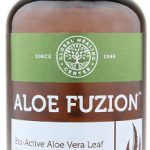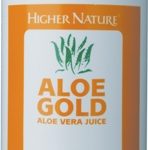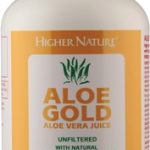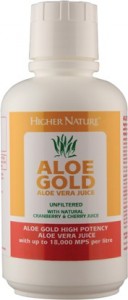Long a favourite ingredient of skincare and cosmetic products, aloe vera isn’t just good for your skin and keeping you looking young… you may not know it, but due to its plethora of beneficial components, it can help maintain your health on the inside too. Doubtful? Well, if so; you need to read on, truly. Because, as a natural ingredient, it’s been used for centuries in traditional Indian medicine for everything from constipation to infections and colic to worm infestation – as well as skin diseases. Nowadays, of course, thanks to its widespread use as an ingredient in cosmetics and food products, its production is one of the biggest botanical industries in the world. But should it be recognised for being more than it is by many? Frankly, the facts speak for themselves…
Aloe vera – the lowdown
Believed by experts to be the most biologically active of all the species of the aloe plant, aloe vera actually comprises more than 75 potentially active components; these constituent parts include amino acids (20 of them out the total 22 required by the human body), as well as anthaquinones, enzymes, lignin, minerals, saccharides, salicylic acids, saponins and, of course, vitamins. Here’s a breakdown of what aloe vera contains – its many active components 1:
- Vitamin A (an antioxidant that helps to combat free radicals), Vitamin C (protects the body from cardiovascular disease, eye disease and prenatal health problems) and Vitamin E (another powerful antioxidant), as well as Vitamin B12, choline and folic acid
- The health-aiding enzymes aliiase, alkaline amylase, bradykinase, carboxypeptidase, catalase, cellulase, lipase, peroxidease and phosphatase
- human-body-enhancing minerals including calcium, chromium, copper, manganese, magnesium, potassium, selenium, sodium and zinc
- as many as 12 anthraquinones (laxatives), including aloin and emodin that can operate as analgesics and are capable of anti-bacterial and anti-viral activity too
- the fatty acids beta-sisosterol, campesterol, cholesterol and lupeol, lending aloe vera anti-inflammatory properties
- the hormones that are auxins and gibberellins are also anti-inflammatory and can aid with wound-healing.
Aloe vera health benefits
So, thanks to all these components; aloe vera is, on the inside of the body, capable of providing significant help with the following issues, conditions and functions:
Constipation
A number of studies have looked into the use of aloe latex from aloe vera as a laxative; as established, its anthraquinones provide it with a potent laxative effective, thus increasing water content in the intestines, leading to stimulation of mucus secretion and bringing about intestinal peristalsis (the contractions that ensure food’s broken down and blended with the intestine’s gastric juices and acidic fluid). Taking one study as an example (among 28 healthy adults), aloe latex achieved a successful laxative effect versus a placebo, ensuring it can be claimed not just to be a natural remedy for constipation but more effective than over-the-counter synthetic medicine specifically manufactured for that purpose2.
Digestion
Also because of its laxative benefits (in combination with its anti-inflammatory properties), aloe vera can aid another digestive area; this one being a function rather than an issue, though – general digestion. This is because it helps in the normalisation of acid-alkaline (pH) balance, reduces the formation of harmful yeast while encouraging ‘good’ digestive bacteria and contributing to the regularisation of bowel processing.
Indeed, for those suffering from irritable bowel syndrome (IBS), research has proved that oral consumption of aloe vera twice a day can reduce the level of discomfort (and flatulence)3, while another study on rat subjects with gastrointestinal issues has found that their gastric acid levels considerably decreased thanks to aloe vera4. It should be noted too that extracts of the plant can be deployed to soothe and heal stomach ulcers thanks to anti-bacterial, healing benefits that contribute to the restoration of the stomach lining.
Immunity
Among the aforementioned enzymes aloe vera contains, one in particular is of great benefit to the immune system. Bradykinase does a great job in stimulating the immune system and even going so far as to kill infections. Meanwhile, zinc – again, as mentioned, one of aloe vera’s constituent mineral – is essential for effective immune function (it’s crucial for hormone receptors and proteins in the body, which play a key role in healthy immune function); all of this then means the plant is a fine source for combating zinc deficiency.
Additionally, a recent medical report points out that aloe vera is now under consideration for use in dentistry, owing to its efficacy as an antiseptic, anti-inflammatory and antifungal agent, in addition to its value in boosting the immune system without leading to allergic reactions or side effects5.
Diabetes
Finally, one of the major problems that those who suffer from diabetes encounter is the risk of cardiovascular complications. However, there is some evidence gleaned from human and animal subjects that points to aloe vera being effective at diminishing the chronic hyperglycaemia and perturbed lipid profile in diabetes sufferers that can lead to such cardiovascular issues 6.
Aloe vera natural supplements
Now, you might very well be aware of how and where to get hold of aloe vera-featuring skincare and cosmetic products, but where should you turn to for extracts of the plant that are suitable for consumption to benefit your body’s insides? Well, one way, of course – and one that’s probably not immediately obvious – is to go direct to the source itself; that is, to grow your own aloe as a potted plant at home. Yes, really. It’s not actually as expensive as it sounds. That said, if purchasing aloe vera seeds and tending to your very own plant seems a little extreme (if then you’d rather buy extracts than seeds to grow them from), then there is another option – natural supplementation. Indeed, among the different, excellent aloe vera supplements you’ll find we sell at The Finchley Clinic are these three following examples:

Aloe Fuzion – the highest quality, most bioavailable and most immunomodulatory version of aloe vera available.

Aloe Gold Natural – made from fresh, whole aloe leaves, this product uses gentle technology that extracts up to 20 times more vital nutrients than most other aloe juice and gels.
 Aloe Gold Cherry/ Raspberry – a version of Aloe Gold blended with 7% unsprayed cranberry and cherry juices for a fantastic flavour.
Aloe Gold Cherry/ Raspberry – a version of Aloe Gold blended with 7% unsprayed cranberry and cherry juices for a fantastic flavour.
References:
- Surjushe A., Vasani R. and Saple D. G. ‘Aloe vera: a short review’. Indian J Dermatol. 2008; 53 (4): 163–166. doi: 10.4103/0019-5154.44785.
- Foster M., Hunter D. and Samman S. ‘Chapter 3: Evaluation of the Nutritional and Metabolic Effects of Aloe vera’ in ‘Herbal Medicine: Biomolecular and Clinical Aspects: 2nd edition’. Boca Raton (FL): CRC Press/Taylor & Francis; 2011.
- Khedmat H., Karbasi A., Amini M., Aghaei A. and Taheri S. ‘Aloe vera in treatment of refractory irritable bowel syndrome: Trial on Iranian patients’. J Res Med Sci. 2013 Aug; 18 (8): 732.
- Keshavarzi Z. et al. ‘The effects of aqueous extract of Aloe vera leaves on the gastric acid secretion and brain and intestinal water content following acetic acid- induced gastric ulcer in male rats’. Avicenna J Phytomed. 2014 Mar-Apr; 4 (2): 137–143.
- Sujatha G., Kumar G. S., Muruganandan J. and Prasad T. S. ‘Aloe vera in dentistry’. J Clin Diagn Res. 2014 Oct; 8 (10): ZI01-2. doi: 10.7860/JCDR/2014/8382.4983. Epub 2014 Oct 20.
- Syed T. A., Ahmad S. A., Holt A. H., Ahmad S. A., Ahmad S. H. and Afzal M. ‘Management of psoriasis with Aloe vera extract in a hydrophilic cream: A placebo-controlled, double-blind study’. Trop Med Int Health. 1996; 1: 505–09.

